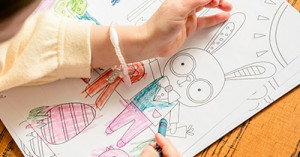Confidence is crucial for setting and achieving goals in all stages and areas of life. However, confidence is not something that one child is born with more than others; rather confidence grows as a result of positive experiences and adult guidance. The following provides strategies to boost confidence in children.
Love Unconditionally
Feeling loved and accepted without preconditions is the foundation for building confidence. Children need to know whether they fail or succeed, they will always be loved. This will give them the emotional strength to explore new challenges and experiences, succeed and feel good about themselves.
Let Them Try
An adult may not even realize how much they are doing for children. Consider if the child is physically capable of wearing their jacket, carrying their backpack or stacking blocks and if they can, let them do things for themselves. When you jump in and do something for the child that they can, do on their own, they are not only robbed of an opportunity to feel successful but tempted to become lazier.
Ensure Age-appropriate Tasks
It makes sense to encourage children to be independent only when the tasks are age appropriate. This is because confidence grows with the successful completion of tasks. So if a child is given a task that is much tougher than their developmental phase, they are likely to fail and lose confidence. For example, telling toddlers to write well-formed letters or tie shoelaces is inappropriate; instead, they can be told to build blocks or colour big shapes.
Handle Failures With Care
How you handle their failing is crucial to building confidence. Whether a toddler is trying to open a box or a young child is learning to copy letter forms, there are bound to be setbacks along the way. It is important to allow children to fail and sent out the message that such hiccups are a normal part of learning. At the same time, assure them that you are not abandoning them but will be around to offer support and encouragement so that they feel confident to try again.
Teach Self-encouragement
Show children how to be internally focused for praise and encouragement. So if a child succeeds at a task, instead of saying, “I am so proud of you”, say “You should be so proud of yourself”. Or when a child has cleaned up nicely, say “You cleaned up on your own, that must feel so nice” rather than, “I like that you cleaned up your space”. This will help a child draw on their own reserves of self-esteem when faced with challenging situations in future rather than feel inadequate when there is no adult around to offer validation.
Further Reading
Building Confidence In Children - The following article provides strategies that Educators can use to build confidence in children so that they can achieve the best life and learning outcomes.
Self-Esteem Development From Babies To Preschoolers - The following article provides information on What Is Self Esteem, How Self Esteem Develops, Self Esteem Strategies For Babies, Toddlers and Preschoolers.







 As an Educator in Australia, your pay rate falls under the Children’s Services Award 2010. This award states the minimum amount that an employer can
As an Educator in Australia, your pay rate falls under the Children’s Services Award 2010. This award states the minimum amount that an employer can When working as a qualified Early Childhood Teacher (with a university degree) within a service, your rate of pay will come from the Educational Services
When working as a qualified Early Childhood Teacher (with a university degree) within a service, your rate of pay will come from the Educational Services When working as a Diploma Qualified Educator your pay rate is from the Children's Services Award 2010. This Award states your minimum rate of pay
When working as a Diploma Qualified Educator your pay rate is from the Children's Services Award 2010. This Award states your minimum rate of pay When working as a Cert 3 Qualified Educator, your pay rate is from the Children's Services Award 2010. This Award states your minimum rate of
When working as a Cert 3 Qualified Educator, your pay rate is from the Children's Services Award 2010. This Award states your minimum rate of Educational Leaders play a crucial role in their early childhood service by ensuring that the educational program aligns with best practices and supports the holistic
Educational Leaders play a crucial role in their early childhood service by ensuring that the educational program aligns with best practices and supports the holistic In early childhood education and care, ratios are more than a technicality—they are a frontline safeguard. Every child deserves responsive supervision, emotional connection, and developmental
In early childhood education and care, ratios are more than a technicality—they are a frontline safeguard. Every child deserves responsive supervision, emotional connection, and developmental With the new national child safety reforms kicking in on 1 September 2025, early childhood services like yours have a real opportunity to lead the
With the new national child safety reforms kicking in on 1 September 2025, early childhood services like yours have a real opportunity to lead the Here’s a comprehensive Mobile Phone and Smart Watch Policy tailored for early childhood education and care (ECEC) services in Australia, aligned with the latest 2025
Here’s a comprehensive Mobile Phone and Smart Watch Policy tailored for early childhood education and care (ECEC) services in Australia, aligned with the latest 2025 The Sea of Fish Challenge is a national initiative that invites children, educators, families, and communities to create and display fish artworks as a symbol
The Sea of Fish Challenge is a national initiative that invites children, educators, families, and communities to create and display fish artworks as a symbol Across the early childhood education and care sector, educators are sounding the alarm: current staffing ratios are insufficient to deliver safe, meaningful, and developmentally appropriate
Across the early childhood education and care sector, educators are sounding the alarm: current staffing ratios are insufficient to deliver safe, meaningful, and developmentally appropriate


